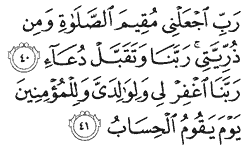Living The Quran
From Issue: 655 [Read full issue]
Lordship of God
Ibrahim (Abraham) - Chapter 14: Verses 40-41
 "My Lord, cause me and my offspring to establish prayers. My Lord, accept my prayer. Our Lord, grant Your forgiveness to me and my parents, and all believers on the Day when the reckoning will come to pass."
"My Lord, cause me and my offspring to establish prayers. My Lord, accept my prayer. Our Lord, grant Your forgiveness to me and my parents, and all believers on the Day when the reckoning will come to pass."
Abraham's long and humble supplication, which also mentions a number of God's blessings and expresses gratitude and thanks for them, comes to a close with these verses. It imparts an air of gentle tenderness and care which makes people's hearts long to be with God, and remember His grace and blessings.
Abraham follows his thanksgiving with a supplication to God to make him always thankful. His thanks take the form of prayer, worship and obedience to God. Thus he declares his determination to always be a devout worshipper, but fears that something may divert him from it. Hence, he prays that God may help him to carry out his intention. Abraham, the father of a long line of prophets, is seen as a pious servant who does not forget His Lord's grace, or his duty to be thankful for it.
We note how Abraham repeats several times the addressing phrase, "My Lord" or "Our Lord". This repeated acknowledgement of God's Lordship over him and his offspring is significant. He does not mention God by His attribute of Godhead, but instead by His Lordship. Godhead has rarely been a subject to controversy even in ignorant societies. Nor was it so in the ignorant society of Arabia at the advent of Islam. What people have always argued about is the Lordship of God, and the need to submit to Him in everyday life on earth.
This is in fact the central point between submission to God, and believing in His oneness on the one hand, and the association of partners with Him on the other. People either submit to God, and this means that they acknowledge Him as their Lord, or they submit to others who would become their Lords. This makes all the difference in life. The Quran relates Abraham's supplication to the Arab idolaters, emphasizing his acknowledgement of God's Lordship to draw their attention to the fact that their own way of life was in complete contrast with what this supplication truly signifies.
Compiled From:
"In The Shade of The Quran" - Sayyid Qutb, Vol. 10, pp. 284,285